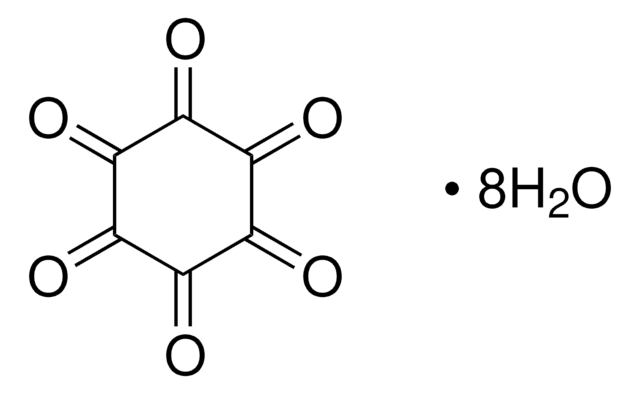230898
Antimony(III) oxide
powder, 5 μm, ReagentPlus®, 99%
Synonym(s):
Diantimony trioxide
Sign Into View Organizational & Contract Pricing
All Photos(3)
About This Item
Linear Formula:
Sb2O3
CAS Number:
Molecular Weight:
291.52
EC Number:
MDL number:
UNSPSC Code:
12352303
eCl@ss:
38080202
PubChem Substance ID:
NACRES:
NA.23
Recommended Products
Quality Level
product line
ReagentPlus®
Assay
99%
form
powder
particle size
5 μm
bp
1550 °C (lit.)
mp
655 °C (lit.)
SMILES string
O=[Sb]O[Sb]=O
InChI
1S/3O.2Sb
InChI key
ADCOVFLJGNWWNZ-UHFFFAOYSA-N
Looking for similar products? Visit Product Comparison Guide
Application
- Thermal Decomposition and Carbothermal Reduction: Examines the recycling and purification processes of Antimony(III) oxide from metal oxides, valuable for those interested in sustainable metallurgy (Karlsson et al., 2018).
- Oxidation of Antimony(III) in Soil by Manganese(IV) Oxide: Studies the interaction between manganese oxide and antimony(III) oxide in soils, providing insights into environmental chemistry and soil remediation (Fu et al., 2018).
- Adsorption of Antimony(V) onto Mn(II)-Enriched Surfaces: Focuses on how manganese oxide interacts with antimony(V), relevant for those studying adsorption processes and water treatment technologies (Liu et al., 2015).
- Kinetic Modeling of Antimony(III) Oxidation and Sorption in Soils: Provides a kinetic model of antimony(III) interactions with environmental matrices, useful for environmental scientists and chemists involved in pollution control (Cai et al., 2016).
Legal Information
ReagentPlus is a registered trademark of Merck KGaA, Darmstadt, Germany
Signal Word
Warning
Hazard Statements
Precautionary Statements
Hazard Classifications
Carc. 2
Storage Class Code
13 - Non Combustible Solids
WGK
WGK 1
Flash Point(F)
Not applicable
Flash Point(C)
Not applicable
Personal Protective Equipment
dust mask type N95 (US), Eyeshields, Gloves
Certificates of Analysis (COA)
Search for Certificates of Analysis (COA) by entering the products Lot/Batch Number. Lot and Batch Numbers can be found on a product’s label following the words ‘Lot’ or ‘Batch’.
Already Own This Product?
Find documentation for the products that you have recently purchased in the Document Library.
Customers Also Viewed
R O Jenkins et al.
Human & experimental toxicology, 17(4), 231-238 (1998-06-09)
1. The aerobic filamentous fungus S. brevicaulis IMI 17297 methylated antimony from Sb2O3 substrate, with the formation of gaseous trimethylantimony (TMA). No evidence was found for the generation of other gaseous antimony compounds by this organism. 2. Biovolatilization of inorganic
Y Zhong et al.
Guang pu xue yu guang pu fen xi = Guang pu, 20(2), 232-236 (2003-09-05)
An ICP-AES method was established for the simultaneous determination of Hg and As in crude antimony trioxide. The samples with different grades were digested in hydrochloric acid-tartraic acid-potassium chloride using microwave process system. The method is applied to analyze crude
Anal K Jha et al.
Biotechnology journal, 4(11), 1582-1585 (2009-10-22)
A low-cost green and reproducible microbe (Lactobacillus sp.)-mediated biosynthesis of Sb(2)O(3) nanoparticles is reported. The synthesis was performed at around room temperature. X-ray and transmission electron microscopy analyses were performed to ascertain the formation of Sb(2)O(3) nanoparticles. X-ray analysis indicated
[Report on analysis of lung biopsy of pneumoconiosis exposed to antimony trioxide].
Xiao-ping Li et al.
Zhonghua lao dong wei sheng zhi ye bing za zhi = Zhonghua laodong weisheng zhiyebing zazhi = Chinese journal of industrial hygiene and occupational diseases, 26(4), 237-238 (2008-08-30)
W J Hall et al.
Environmental technology, 28(9), 1045-1054 (2007-10-04)
This work has investigated the effect that antimony trioxide has on the pyrolysis of styrenic polymers and the effect that different types of brominated flame retardants used in plastics have on the composition of the pyrolysis products. Brominated high impact
Our team of scientists has experience in all areas of research including Life Science, Material Science, Chemical Synthesis, Chromatography, Analytical and many others.
Contact Technical Service











